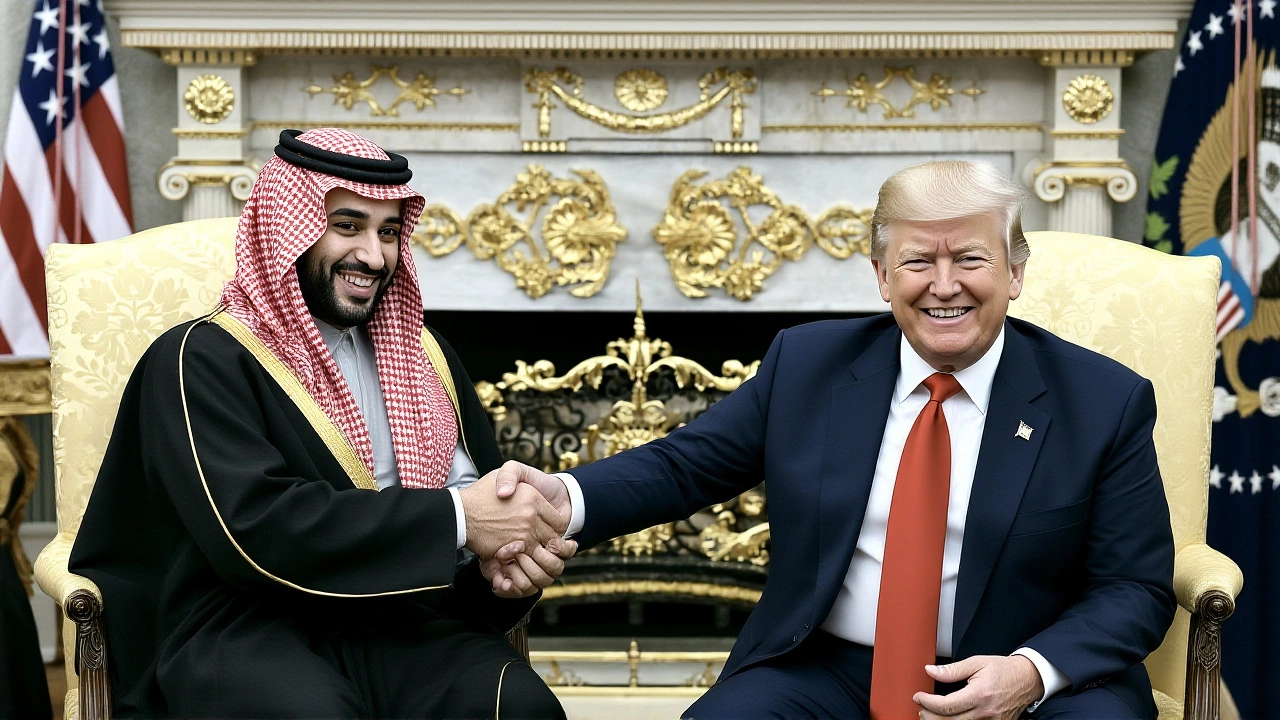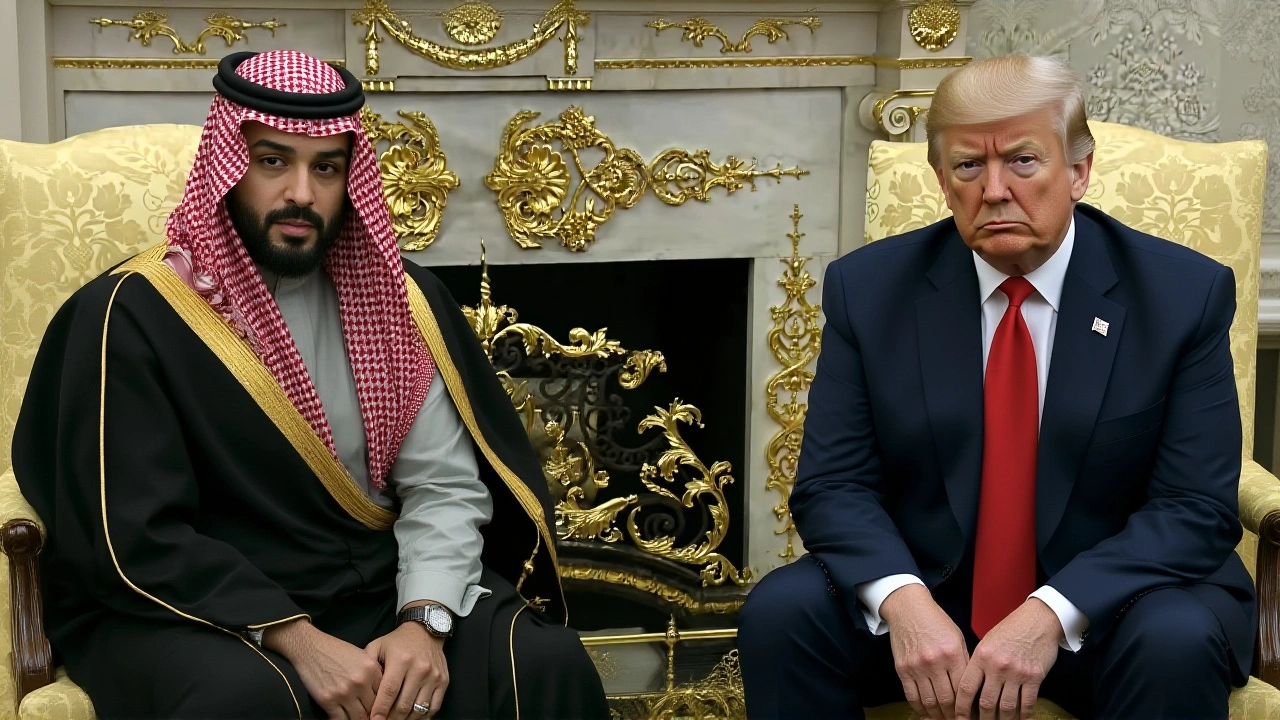When Donald J. Trump greeted Mohammed bin Salman on the South Lawn of the White House on November 18, 2025, the military flyover thundered overhead, the United States Marine Band played a rousing march, and the moment felt like a victory lap — not a reckoning. Seven years after the brutal murder of Jamal Khashoggi, the Washington Post journalist whose disappearance inside the Saudi consulate in Istanbul shocked the world, the U.S. and Saudi Arabia were signing deals worth billions — and Trump made it clear: the past was closed.
"Things happen" — Trump dismisses Khashoggi inquiry
Reporters pressed Trump about Khashoggi’s killing as the Crown Prince stepped off the presidential limousine. One asked directly: "How do you reconcile your friendship with Prince Mohammed after what happened in Istanbul?" Trump didn’t flinch. "Things happen," he replied, then turned to his aides with a sharp gesture: "Don’t embarrass our guest." It was a moment that spoke louder than any policy speech. The CIA had concluded in 2018 that Mohammed bin Salman personally ordered the operation. Trump had dismissed that finding then — saying, "maybe he did and maybe he didn’t" — and now, in 2025, he was treating the entire episode as a footnote.
The silence from the White House on human rights was deafening. Khashoggi, a Virginia resident and father of two, had entered the consulate to obtain paperwork for his upcoming marriage. He was never seen again. His body was dismembered. The Saudi government initially denied involvement, then admitted he was killed in a "rogue operation." But U.S. intelligence agencies, including the Office of the Director of National Intelligence, later confirmed the operation had been planned at the highest levels — with the Crown Prince’s fingerprints all over it.
Billion-dollar deals overshadow human rights concerns
But the optics didn’t matter to the business teams in the room. By midday, officials from Saudi Arabia’s Public Investment Fund and U.S. tech firms had inked a $4.2 billion agreement to develop artificial intelligence infrastructure across Texas, Nevada, and Virginia. Another $1.8 billion was pledged for civil nuclear energy cooperation — a deal that would allow Saudi Arabia to build its first civilian nuclear reactors under U.S. oversight, a major diplomatic win for Riyadh.
"This isn’t about history," said one senior White House aide, speaking off-record. "It’s about the next 20 years. The Saudis are investing in AI, quantum computing, defense tech. We need their capital. They need our tech. That’s the new calculus."
The day’s agenda didn’t stop there. Trump and Mohammed bin Salman held closed-door talks on Middle East security, including Iran’s nuclear program and the future of Yemen. An evening reception hosted by First Lady Melania Trump in the East Room featured live music, a curated art exhibit of Saudi modernists, and — as confirmed by an anonymous administration source — an appearance by Cristiano Ronaldo, the 39-year-old Portuguese soccer legend now playing for Al Nassr in the Saudi Pro League. His presence was symbolic: a global icon lending star power to a regime seeking legitimacy through soft power.
Human rights groups sound alarm — but are ignored
A coalition of 11 human rights organizations, including Human Rights Watch, Amnesty International, and the Committee to Protect Journalists, had issued a joint statement ahead of the visit, urging the Trump administration to demand "concrete, measurable commitments on press freedom and accountability." They pointed to Saudi Arabia’s continued imprisonment of women’s rights activists and its suppression of dissent.
"This isn’t diplomacy. It’s transactional amnesia," said Sarah Leah Whitson, executive director of Middle East Watch. "They’re trading justice for jet fuel."
But the White House didn’t budge. No joint statement on human rights. No mention of Khashoggi’s family. No call for a transparent trial of those involved. Instead, the administration released a fact sheet titled "Strengthening U.S.-Saudi Strategic Partnership," listing economic and defense cooperation as the sole priorities.

A pattern of realignment — and a dangerous precedent
This isn’t the first time Trump has chosen realpolitik over principle. In 2017, he hosted Mohammed bin Salman at Mar-a-Lago and called him a "great guy." In 2018, he rejected the CIA’s assessment of the Khashoggi killing and doubled down on arms sales. Now, in 2025, he’s cementing a new era of U.S.-Saudi alignment — one that sidelines moral accountability for economic and geopolitical gain.
What’s troubling isn’t just the deal-making. It’s the normalization. Khashoggi’s murder was a watershed moment. It led to Senate resolutions condemning Saudi Arabia, severed ties with key Saudi officials, and even prompted a rare bipartisan rebuke of the White House. Now, that moment has been erased from the official narrative. The media, too, has moved on. ABC News’ Karen Travers, who covered the 2018 aftermath, described the 2025 visit as "the first time the prince has come to the U.S. since Jamal Khashoggi’s murder" — and yet, in her reporting, the killing was an afterthought.
What’s next? The long shadow of silence
As the Crown Prince departs Washington, the question isn’t whether the deals will go through — they will. The question is: what does this say about American values? When a U.S. president shrugs off the murder of a journalist who was also a U.S. resident, and then celebrates the man accused of ordering it with a military band and a $6 billion investment package, it sends a message to autocrats worldwide: silence buys you a seat at the table.
And if the next journalist who speaks out knows that their death won’t cost a single contract, won’t delay a single deal, won’t even make the evening news — then the world has changed. Not because of technology or economics. But because of choice.
Frequently Asked Questions
Why did Trump ignore the CIA’s conclusion about Khashoggi’s murder?
Trump has consistently prioritized geopolitical and economic interests over human rights accountability. In 2018, he rejected the CIA’s assessment that Mohammed bin Salman ordered the killing, saying "maybe he did and maybe he didn’t" — a phrase he repeated in 2025. His stance reflects a long-standing belief that Saudi Arabia is essential to U.S. energy security, arms sales, and countering Iran. The $6 billion in new deals further solidified this calculus, making moral criticism politically inconvenient.
How has the U.S. government responded to Khashoggi’s killing since 2018?
After the 2018 murder, the U.S. imposed visa bans on 76 Saudi individuals linked to the killing and suspended some military training programs. But no sanctions targeted the Crown Prince himself. In 2020, the State Department quietly lifted restrictions. By 2025, the Biden administration had resumed arms sales and high-level visits. Trump’s 2025 welcome marked the full reversal of post-Khashoggi diplomatic cooling — signaling that accountability is now optional in U.S.-Saudi relations.
What’s the significance of Cristiano Ronaldo attending the White House event?
Ronaldo’s presence was a deliberate signal of Saudi Arabia’s "sportswashing" strategy — using global celebrities to soften its international image. His $200 million contract with Al Nassr in 2023 was one of the largest in sports history, funded by Saudi Arabia’s sovereign wealth fund. His appearance at the White House lent glamour to a regime under global scrutiny, helping reframe the narrative from human rights abuses to economic ambition and global influence.
What impact will the $6 billion in AI and nuclear deals have on U.S. security?
The AI infrastructure investment will give Saudi Arabia access to cutting-edge U.S. machine learning tools, raising concerns about dual-use technology that could enhance surveillance capabilities. The civil nuclear deal includes uranium enrichment technology under IAEA safeguards — but critics warn that without strong oversight, it could lay the groundwork for future weapons development. Both deals bypassed congressional review, raising alarms among arms control experts who say this sets a dangerous precedent for bypassing democratic oversight in exchange for foreign investment.
Is this a turning point in U.S. foreign policy?
Yes. This visit signals a return to the pre-2018 model of U.S. diplomacy: prioritizing stability and access over human rights. It echoes Cold War-era alliances with authoritarian regimes for strategic gain. But unlike the Soviet Union, Saudi Arabia’s internal repression is more visible and documented. The normalization of Mohammed bin Salman suggests the U.S. is willing to trade its moral authority for economic and security partnerships — a shift that could embolden other autocrats to act with impunity.
What’s next for Jamal Khashoggi’s family?
His widow, Hatice Cengiz, continues to campaign for justice, but U.S. courts have dismissed her civil suit against the Saudi government on sovereign immunity grounds. The U.S. has never extradited any suspects, and no Saudi official has faced criminal charges. With Trump’s 2025 embrace of the Crown Prince, the family’s hope for U.S.-led accountability has effectively ended. They now rely on international tribunals and Turkish prosecutors — whose efforts remain stalled without U.S. cooperation.
